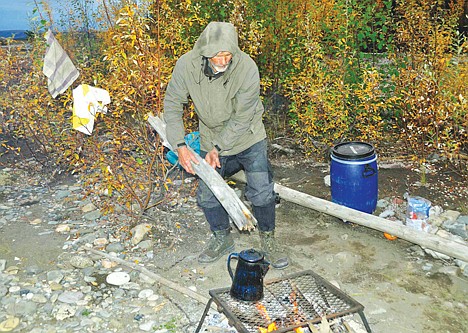'I'm very lucky to be alive'
SANDPOINT - Stuart Nelson always knew that he was never truly alone in the wilderness.
Despite the overpowering sense of isolation, the Sandpoint resident recognized that the fauna of the natural environments were never far away. But while stranded in the northwest Canadian wilderness this fall, Nelson encountered something else. And that something saved his life.
A veterinarian by trade, Nelson relies on the loneliness in the Canadian woodlands and waterways to clear away life's stresses. A Christian by faith, he uses the quiet for spiritual refreshment. To date, Nelson has 18 extended solo river trips under his belt, but even that level of experience didn't prevent disaster from occurring. It did, however, yield the know-how to respond appropriately and survive more than two weeks alone in the wild.
"I'm very lucky to be alive," he said, "and I hope that lessons learned from my experience might help out others in the future."
Nelson estimated to his family and colleagues before leaving on his mid-August trip that he'd return by early September and promised to keep them updated via satellite phone. By Aug. 14 he was deep in Yukon territory just east of Alaska kayaking down the area's many streams and rivers. By Aug. 21, Nelson paddled through the Yukon heartland by way of the Little Wind River.
Here, he faced a subtler threat than the region's grizzly bears and unfriendly geography. The river had eroded the bank, causing nearby spruce trees to tip into the water and comb along the surface. Known as sweepers, these obstacles are notorious for overturning fast-moving water craft. As Nelson rounded a bend in the river, he encountered a sweeper directly in his path.
"There was no way I could avoid a collision," he said. "Since I was going to hit it one way or another, I tried to determine the best spot to ram without causing serious damage."
The river had other ideas, wedging his inflatable kayak underneath the tree trunk and throwing Nelson into the water. After scrambling to shore, he approached his ensnared raft and attempted to free it.
"At that point, I made two mistakes," he said. "The first was that I let myself make a mistake in the first place. The second was that I got separated from my boat."
In Nelson's efforts to free the craft, it caught an undercurrent beneath the sweeper and shot underwater. It resurfaced on the other side of the fallen tree, popping from the water like a fish.
"I didn't even try to chase after it," he said. "It was moving way too quickly."
Nelson had stowed his food supplies, extra clothing, camping equipment and satellite phone among the boat's cargo. A knife, some snare wire, a signal mirror, a can of highly flammable Sterno, a space blanket, a tincture of iodine, three fishing lures and some fishing line were the only items he had on his body. His clothing included a warm shirt, a pair of water-resistant dry pants, good boots and his life jacket.
"The most important thing you need to remember about survival gear is that it's not survival gear if it's not on your body," he said.
Nelson remained calm in the face of his circumstances. He first decided to follow the flow of the river in the chance that his raft had lodged on another obstruction. Several miles into the hike, he realized that the boat could be lost in any one of the area's many tributaries. His best option, he determined, was to find a comparatively hospitable site where the Little Wind met the Wind River. In that area, he had a chance of flagging down an aircraft or other boaters. Outside of that hope, his best bet was to remain stationary and wait for a search party.
By the time he reached the large gravel bar between the rivers, Nelson was already exhausted. He found a depression near the tree line substantial enough to offer shelter and cut up branches to fashion a windbreak. After starting a fire with the help of the Sterno, he hunkered down for a long wait.
In the next 14 days, Nelson developed a daily routine. He rose with the dawn to cut his firewood and gather around 200 rose hips, one of his primary sources of sustenance. As the morning progressed, he returned to the river to keep an eye out for boaters or airplanes. He spent his days fishing for grayling salmon in the river, his other common food source.
"There wasn't really any easy way to cook them," he said. "The only method was to put them on sticks and that didn't work well at all. So I just ate them raw."
After cleaning his catches, Nelson would bite out the eyes and gills. Then he ate them much like corn on the cob, consuming everything except for the tail and spine. He tossed out what little remained to avoid attracting grizzlies.
"It was kind of a strange version of sushi," he said.
During the first few days, Nelson also took measures to communicate his situation. He spelled out "help" using large sticks and "SOS" with rocks in the gravel bar. He also made sure to smoke his campfires in hopes of attracting attention. At one point, he attempted to light a tree on fire, a task that proved much more difficult in execution.
"I got a few branches to burn, but that fizzled out pretty quickly," he said. "I couldn't get that tree to light for anything."

